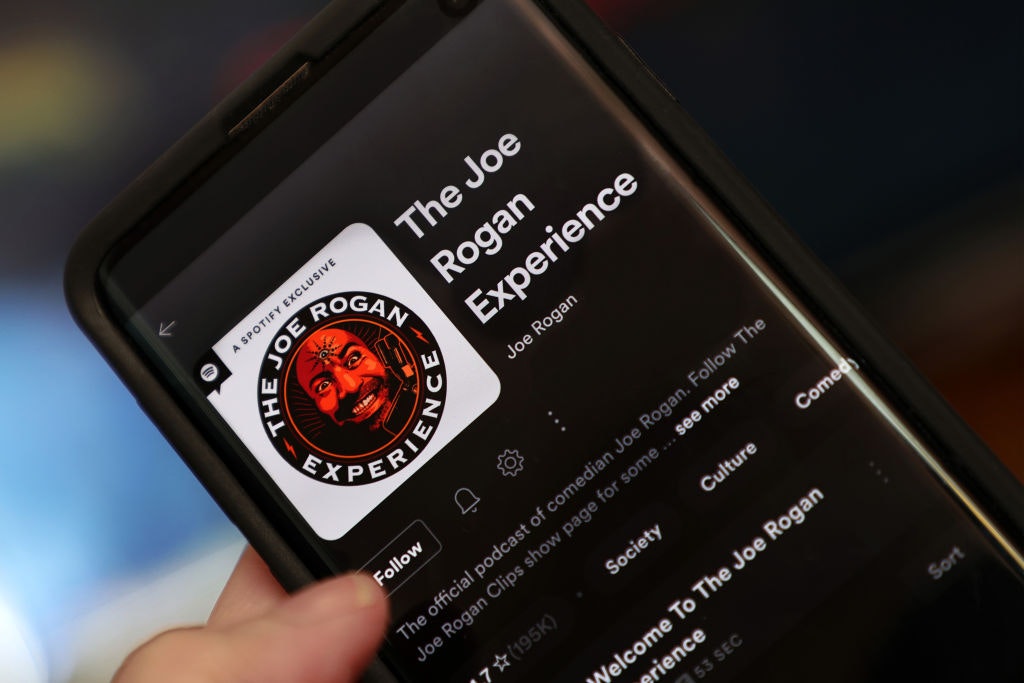More On: Joe Rogan
Joe Rogan became the Goliath of podcasting
Rogan's Remorse
The War on Free Speech
Joe Rogan's Right to Speak
Thank you, Joe Rogan, for bringing Neil Young and Joni Mitchell's resuscitation to the attention of the nation
Plus: the reality about 'free' COVID-19 testing, plus much more...
Joe Rogan, a comedian and podcaster, is embroiled in a series of issues.
It all started when "The Joe Rogan Experience" featured COVID-19 vaccine skeptic Robert Malone, and a number of artists protested by removing their songs from Spotify. It has continued with Rogan apologizing for using racist slurs in previous years, prompting the streaming site to erase dozens of his prior shows.
Given Rogan's hundreds of hours of video, the investigation is unlikely to end there. As we show in our upcoming book, Rogan's podcast has long championed right-wing humor and libertarian political views, including those that deal in bigotry and sexism with relish.
However, what distinguishes Rogan's growth is that it goes beyond the normal partisan political squabbles that Americans have become used to in social and broadcast media.
Rogan is more than simply a propagator of right-wing views. He has also established an empire by bringing these ideas — and a broad variety of others – to listeners from all political stripes. His genuinely distinctive ability is attracting a vast, youthful, mostly male following from that range, which marketers greatly prize.
Ideological turpitude
When the Federal Communications Commission implemented the Fairness Doctrine in 1949, radio and television broadcasters were compelled to convey contentious topics in a way that represented many points of view. The combination of cable television, specialized customer targeting, and President Ronald Reagan's deregulatory FCC, however, was successful in overturning the requirement.
By 1987, conservative talk radio stars like Rush Limbaugh had completely embraced political tactics to content production and audience growth. Ignoring their political opponents as potential listeners, they drifted more to the right, attracting an increasingly homogenous audience that marketers could easily target.
Later, when Fox News' reputation and reach increased, it adopted a similar strategy, boosting conservative media figures such as Bill O'Reilly, Sean Hannity, Tucker Carlson, and Greg Gutfeld to preach to the right-wing choir.
Today, conservative commentators like Ben Shapiro and Steven Crowder take this reasoning a technical step further, embracing the silo-ing effects of social media algorithms to connect with those people most likely to interact with and spread their material. Although such characters may annoy people who disagree with them, their role in the media is well-established and, for the most part, overlooked by critics.
Rogan, on the other hand, is prone to ideological turpitude.
Initially, he backed Bernie Sanders for President of the United States in 2020. Then he shifted his attention to Donald Trump. He interviews and examines people ranging from fiercely left-wing voices like Cornel West and Michael Pollan to right-wing charlatans like Stefan Molyneux and Alex Jones.
These folks have no political beliefs in common. However, there is a demographic link. For starters, they are all guys, as are the great majority of "The Joe Rogan Experience" guests.
They are also controversial speakers who appeal to young people, especially young males, a population that is notoriously difficult to gather, typically has discretionary means, and believes that conventional political ideals do not represent their own.
While Fox News sells politics to TV viewers, Rogan offers podcast listeners a feeling of edgy authenticity. His combination of humor and controversy has political undertones, but it isn't politics, according to him. It's all about demography.
The biggest draw of Spotify
Rogan's business strategy of acquiring young male listeners, who account for a significant portion of his 11 million listeners every episode, is especially effective in today's divided media climate.
For better or worse, Rogan is a real outlier in the world of current talk media. Most political and many comedic podcasts follow the commercial model of establishing an ideological area, connecting with similar programs via cross-promotion and guest selection, and trusting social media algorithms to push traffic their way.

"The Joe Rogan Experience" takes this concept and twists it in a number of different ways. Until date, media people from many walks of life have desired chances to participate on the program. Once a comic or podcaster has saturated their own political arena, Rogan provides an opportunity to gain new adherents and, in theory, conduct a dialogue devoid of party boundaries. For many Rogan fans, the show's breadth of conversation and defiance of standards is at its core.
Rogan, on the other hand, is far from being a neutral host of a new public realm. His seeming naiveté is all too frequently a front to promote edgy, insulting, and reckless views that play on his audience's self-proclaimed distrust of authority.
He pushes the bounds of political debate by "simply asking questions," but then shelters behind his experience as a comic to avoid any negative consequences.
Spotify, like other streaming services, is founded mostly on a diverse variety of content providers, each of whom draws a tiny, loyal following but none of whom is very significant on their own.
In the podcast realm, Rogan is the closest thing to a popular cultural product. He is also one of the few names in podcasting large enough to attract headlines, good or bad. Rogan's cross-partisan, young, mainstream appeal is difficult to ignore for a corporation like Spotify looking to increase subscribers.
Rogan's latest apologies, on the other hand, show that he is not immune to pressure. We anticipate Spotify will attempt to thread the needle by concealing up Rogan's predilection for disinformation and rude provocation just enough to fulfill the bare minimum of acceptable corporate citizenship while without harming the comedian's brand or demographic appeal.





















